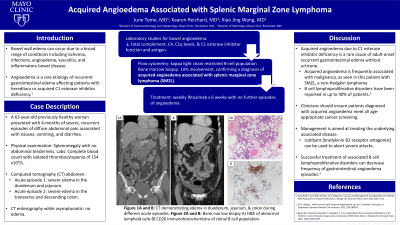Monday Poster Session
Category: Colon
P1675 - Abdominal Pain Due to Acquired Angioedema Associated With Splenic Marginal Zone Lymphoma
Monday, October 23, 2023
10:30 AM - 4:15 PM PT
Location: Exhibit Hall

Has Audio

June Tome, MD
Mayo Clinic
Rochester, MN
Presenting Author(s)
June Tome, MD, Kaaren Reichard, MD, Xiao Jing Wang, MD
Mayo Clinic, Rochester, MN
Introduction: Bowel wall edema can occur due to a broad range of conditions including ischemia, infections, angioedema, vasculitis, and inflammatory bowel disease. Angioedema is a rare etiology of recurrent gastrointestinal edema affecting patients with hereditary or acquired C1 esterase inhibitor deficiency.
Case Description/Methods: A 63-year-old previously healthy woman presented with 4-months of severe, recurrent episodes of diffuse abdominal pain associated with nausea, vomiting, and diarrhea. Physical examination demonstrated splenomegaly with no abdominal tenderness. Complete blood count showed isolated thrombocytopenia of 154 x109/L. Computed tomography (CT) abdomen during an acute episode revealed severe edema in the duodenum and jejunum, and during another acute episode in the transverse and descending colon (Figure 1). Subsequent CT enterography while she was asymptomatic showed no edema. Laboratory studies for bowel angioedema revealed low total complement, C4, C1q levels, as well as C1 esterase inhibitor function and antigen. Flow cytometry showed a kappa light chain restricted B-cell population. Bone marrow biopsy demonstrated 10% involvement with the same population (Figure 2), confirming a diagnosis of acquired angioedema associated with splenic marginal zone lymphoma (SMZL). She was treated with weekly Rituximab for 6 weeks with no further episodes of angioedema.
Discussion: Acquired angioedema due to C1 esterase inhibitor deficiency is a rare cause of adult-onset recurrent gastrointestinal edema without urticaria. Acquired angioedema is frequently associated with malignancy, as seen in this patient with SMZL, an uncommon subtype of non-Hodgkin lymphoma. Clinicians should ensure patients diagnosed with acquired angioedema meet all age-appropriate cancer screening. B cell lymphoproliferative disorders have been reported in up to 40% of patients. The mechanism by which clonal B cell disorders lead to the depletion of C1 esterase inhibitor is not well understood. Icatibant, a bradykinin B2-receptor antagonist, may be prescribed to abort severe angioedema attacks. Management of acquired angioedema is aimed at treating the underlying associated disease. Successful treatment of associated B cell lymphoproliferative disorders commonly results in decreased frequency of gastrointestinal angioedema episodes.

Disclosures:
June Tome, MD, Kaaren Reichard, MD, Xiao Jing Wang, MD. P1675 - Abdominal Pain Due to Acquired Angioedema Associated With Splenic Marginal Zone Lymphoma, ACG 2023 Annual Scientific Meeting Abstracts. Vancouver, BC, Canada: American College of Gastroenterology.
Mayo Clinic, Rochester, MN
Introduction: Bowel wall edema can occur due to a broad range of conditions including ischemia, infections, angioedema, vasculitis, and inflammatory bowel disease. Angioedema is a rare etiology of recurrent gastrointestinal edema affecting patients with hereditary or acquired C1 esterase inhibitor deficiency.
Case Description/Methods: A 63-year-old previously healthy woman presented with 4-months of severe, recurrent episodes of diffuse abdominal pain associated with nausea, vomiting, and diarrhea. Physical examination demonstrated splenomegaly with no abdominal tenderness. Complete blood count showed isolated thrombocytopenia of 154 x109/L. Computed tomography (CT) abdomen during an acute episode revealed severe edema in the duodenum and jejunum, and during another acute episode in the transverse and descending colon (Figure 1). Subsequent CT enterography while she was asymptomatic showed no edema. Laboratory studies for bowel angioedema revealed low total complement, C4, C1q levels, as well as C1 esterase inhibitor function and antigen. Flow cytometry showed a kappa light chain restricted B-cell population. Bone marrow biopsy demonstrated 10% involvement with the same population (Figure 2), confirming a diagnosis of acquired angioedema associated with splenic marginal zone lymphoma (SMZL). She was treated with weekly Rituximab for 6 weeks with no further episodes of angioedema.
Discussion: Acquired angioedema due to C1 esterase inhibitor deficiency is a rare cause of adult-onset recurrent gastrointestinal edema without urticaria. Acquired angioedema is frequently associated with malignancy, as seen in this patient with SMZL, an uncommon subtype of non-Hodgkin lymphoma. Clinicians should ensure patients diagnosed with acquired angioedema meet all age-appropriate cancer screening. B cell lymphoproliferative disorders have been reported in up to 40% of patients. The mechanism by which clonal B cell disorders lead to the depletion of C1 esterase inhibitor is not well understood. Icatibant, a bradykinin B2-receptor antagonist, may be prescribed to abort severe angioedema attacks. Management of acquired angioedema is aimed at treating the underlying associated disease. Successful treatment of associated B cell lymphoproliferative disorders commonly results in decreased frequency of gastrointestinal angioedema episodes.

Figure: Figure 1A and B: CT abdomen demonstrating edema in the duodenum, jejunum, and colon during different acute episodes of severe abdominal pain. Figure 2A and B: Bone marrow biopsy of splenic marginal zone lymphoma A) H&E of abnormal lymphoid cells B) CD20 immunohistochemistry of clonal B cell population.
Disclosures:
June Tome indicated no relevant financial relationships.
Kaaren Reichard indicated no relevant financial relationships.
Xiao Jing Wang indicated no relevant financial relationships.
June Tome, MD, Kaaren Reichard, MD, Xiao Jing Wang, MD. P1675 - Abdominal Pain Due to Acquired Angioedema Associated With Splenic Marginal Zone Lymphoma, ACG 2023 Annual Scientific Meeting Abstracts. Vancouver, BC, Canada: American College of Gastroenterology.
